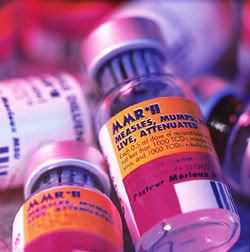 It's pretty commonly known that Andrew Wakefield's 1998 Lancet paper on the link between autism and the MMR vaccine has been the source of considered controversy over vaccinations and autism, even after the majority of the paper authors removed their names and the journal retracted the paper. Wakefield's unethical conduct, the leaps of logic, and the small sample size itself, all contributed to reasons the paper was ultimately discredited.
It's pretty commonly known that Andrew Wakefield's 1998 Lancet paper on the link between autism and the MMR vaccine has been the source of considered controversy over vaccinations and autism, even after the majority of the paper authors removed their names and the journal retracted the paper. Wakefield's unethical conduct, the leaps of logic, and the small sample size itself, all contributed to reasons the paper was ultimately discredited.Unfortunately, that sort of discrediting might hold weight in academic spheres, but doesn't necessarily take hold in the public sphere. It's much more entertaining to write scare-tactic headlines touting fears of vaccines and the rise of autism than it is to say "woops", let alone "woops, we maybe made something worse... sorry about that, please go vaccinate your kids before measles skyrockets to new epidemic proportions."
Hopefully the news that a reproduction of the Wakefield study shows absolutely no link between autism and the MMR vaccine will gain foothold in the media at large, and go a long way towards convincing parents that vaccinating their children is not only a socially responsible action that contributes to the common good (via herd immunity), but is the responsible action as a parent taking care of their child's health.
Like Wakefield's study, the new study looked for evidence of potential links between MMR vaccinations, autism and the digestive (gastrointestinal, or GI) problems sometimes seen in autistic children.
"If in fact you want to implicate a factor in the causation of an illness, it must be present before the illness," said W. Ian Lipkin, a professor of epidemiology, neurology and pathology at Columbia University, explaining the idea behind the study. "In the event MMR was responsible for autism, the MMR must precede the onset of autism. There was no evidence . . . MMR preceded either autism or GI problems" in the children studied, he said.
In the first eight months of this year, there have been almost 140 cases of measles alone. The vast majority of these cases have occurred in unvaccinated children - cases of measles that could have easily been prevented.
Let's hope that this is the final nail in the coffin of the link between the MMR vaccine and autism, and that while research into causes, origins and cures for autism continue, our vaccination rate also goes back up to healthy levels for the entire population.
-Kelly Hills








No comments:
Post a Comment